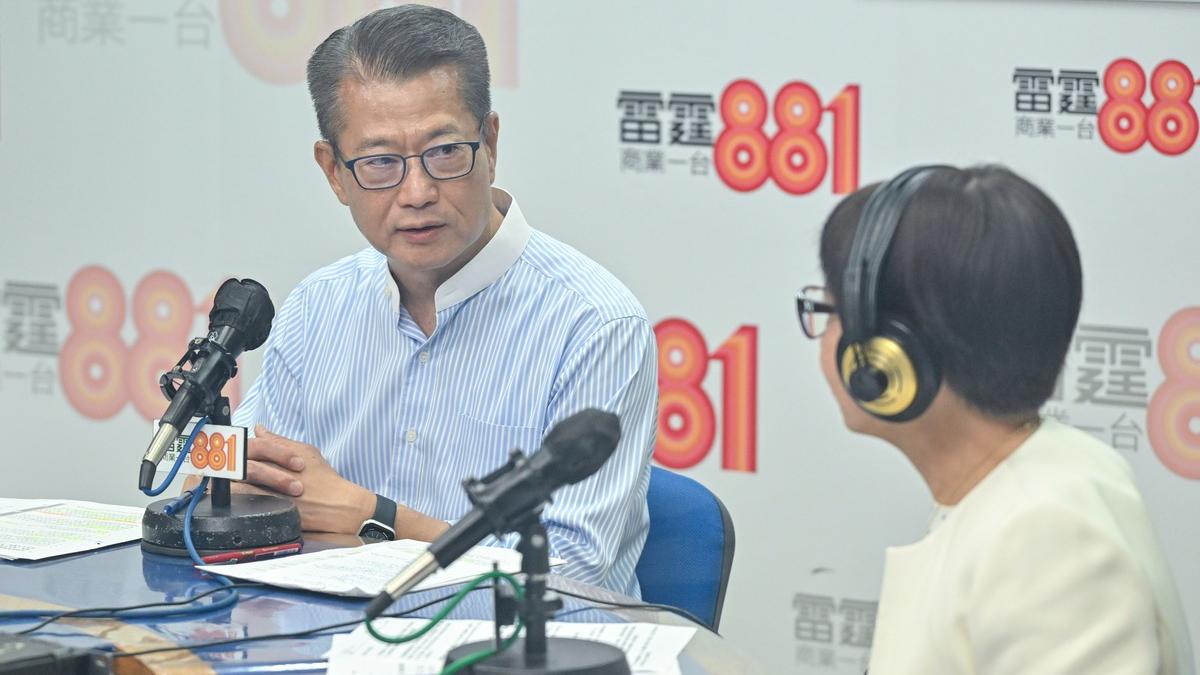 Financial Secretary Paul Chan Mo-po (left) attends a radio program on June 25, 2023 to discuss economic issues. (PHOTO / HASAR GOVERNMENT)
Financial Secretary Paul Chan Mo-po (left) attends a radio program on June 25, 2023 to discuss economic issues. (PHOTO / HASAR GOVERNMENT)
Hong Kong made a significant economic recovery in the first half of 2023, enhancing its role as an international financial center and a global center for innovation and technology, Financial Secretary Paul Chan Mo-po said in his official blog on Sunday.
“Hong Kong as an international financial hub has made fresh progress in the stock market, bonds and banking system, such as the launch of the Hong Kong Dollar-Renminbi Dual Counter Model on June 19 and the issuance of the world’s first tokenized green bonds in February,” the financial chief said.
Against this backdrop, Chan said, “we must seize the opportunities of our country’s development, plan for the long term from a global perspective, and better coordinate a ‘proactive government’ with an ‘efficient market’
A number of initiatives to stimulate the development of innovation and technology proposed by Chief Executive John Lee Ka-chiu in his 2022 Policy Address are being taken forward, and Chan said, “Hong Kong’s I&T development has gained greater recognition and support from the community, and will build up speed.”
READ MORE: Chan: HK's economic outlook more positive after reopening
Hong Kong’s economy improved significantly in the first quarter of the year, 2.7 percent higher than for the same period of 2022. The unemployment rate fell from 4.7 percent in the second quarter of last year to 3 percent.
Also, the residential property market has seen a moderate rebound in both price and volume for the first five months of 2023. Year-on-year retail sales growth surged to almost 22 percent throughout the first four months from late 2022’s 1 percent.
“Hong Kong, however, still faces the pressure of export contraction with a double-digital decline in the first four months of the year, primarily due to the intensified competition among economies and geopolitical tensions, and the fact that the global economy is going downhill,” Chan said, adding that the challenges are expected to continue for the rest of the year.
Against this backdrop, Chan said, “we must seize the opportunities of our country’s development, plan for the long term from a global perspective, and better coordinate a ‘proactive government’ with an ‘efficient market’.”
Chief executive Lee also pointed out that those who do not advance lose ground in a fast-changing world, and thus Hong Kong cannot afford to wait or to be left behind. Lee recently said in a social media video that he is confident in Hong Kong’s outlook, hoping to make the public benefit from the government’s policies.
Since it took office last July, the government has identified a sufficient source of land supply for the city’s development over the next ten years, with a coverage of 3,280 hectares, half of which are in the Northern Metropolis and the proposed Kau Yi Chau Artificial Islands.
READ MORE: Chan: SAR must be on guard against external risks, challenges
According to Chan’s Sunday blog, Hong Kong is expected to build about 360,000 public housing units over the next decade, and provide more choices including light public housing and transitional housing for residents in poor housing conditions who have long been on the waiting list for public rental housing.
The government, Chan revealed in an interview, is consulting with the Hong Kong Monetary Authority and plans to introduce measures to relax the mortgage loan-to-value ratio to relieve residents’ stress of buying houses for self-use.
In addition, the construction works of the proposed railway station at Siu Ho Wan, the Tuen Mun South Extension project and the Kwu Tung Station of the Northern Link will start within the year, as the Tung Chung Line Extension, the government’s first railway project, commenced in late May.


